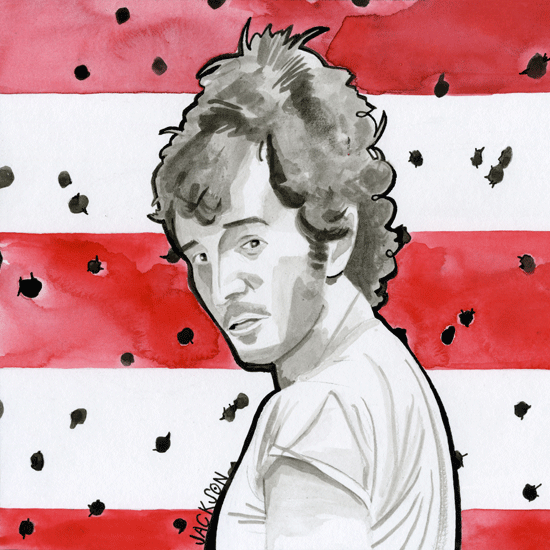
So a middle-aged white dude—a freaking sports writer, no less—went to a Bruce Springsteen show the other night. In 2016 America, as filtered through Twitter and Facebook, that qualifies me as arguably the most predictable of stereotypes. I’m fine with that, except for a couple of minor details.
For one, it was the first time I’d attended a Springsteen show. That seems impossible, especially for someone who grew up in the Springsteenian epicenter of Philadelphia and has lived most of his life within a short drive of Asbury Park, N.J. I’m also someone who has seen about 1.3 million bands over my decades as a serious musical obsessive.
It’s not like I didn’t like Springsteen. I did, and I do. For a variety of reasons, I just never went to see him. I guess there was a part of me that had trouble with the maniacal devotion of many of his fans. I got the sense years ago that the people who saw Springsteen every chance they got didn’t really have interest in any other bands. It felt more like religious fervor or sports fanaticism than it did love of music.
So I had the records and I liked Springsteen as an artist, but I just never went to see him until this summer. I bought the tickets because my wife happens to be one of those True Believer Springsteen fans. For the September show at Citizens Bank Park in Philadelphia, Jenny wore a T-shirt she bought at a 1984 concert at the Rosemont Horizon near Chicago. She was following Bruce and the band around for a while and saw about a half-dozen shows in a week or so. She has photos of her posing with him and everything. (I’m only a little jealous about this.)
She wanted to go, and I figured, hell, why not? It’s not like I was making some kind of statement here. I just hadn’t produced enough enthusiasm to overcome inertia and propel myself to a show. As time went on, in fact, it felt as if I’d missed my chance. Springsteen got older, E Streeters died, and I felt more and more like I should have gone to one of those shows in the late 1970s or early 1980s.
But there I was, standing out in right field in a major-league ballpark on a warm September evening. There was Bruce and the current E Street Band, and they were really great. For a little more than four hours, with almost no interruption, they toured Springsteen’s entire back catalog. It was a really memorable show, and at least now I won’t die without having seen one of the seminal artists of my lifetime.
But that’s not what this is really about.
Midway through the show, Springsteen sang “American Skin (41 Shots),” the song he wrote and recorded in 2000 as a response to the shooting of an unarmed man by New York City police officers.
I was aware of the song and the story of Amadou Diallo’s killing, and the reaction to both, back in 2000. But all of that had faded in memory, even with the events of the last couple years.
It was astonishing to hear an honest, clear reaction to a terrible tragedy, devoid of the noise that surrounds any discussion about these issues in 2016. Before any of us ever heard of Ferguson, Mo., before Black Lives Matter existed as an entity, Springsteen said exactly what needed to be said on the subject.
“It ain’t no secret, no secret, my friend/You can get killed just for living in your American skin.”
Springsteen didn’t make any speeches. He didn’t introduce the song by talking about current events. He didn’t risk turning off fans conditioned to shout their talking points the moment a trigger subject is raised.
He just performed the song in a hushed ballpark, his image projected on three giant video screens as he sang about the “41 shots” that four cops sprayed at an unarmed 23-year-old man. When contrasted with the celebratory, inclusive spirit of classics like “Born To Run” and “Rosalita,” the whole thing was that much more powerful and affecting.
Springsteen’s 34-song set didn’t include “Born In The USA” or “Glory Days.” He could have played either of those hits and kept everyone in the audience feeling happy and contented. Playing “American Skin” was a choice—a brave one, given the present climate.
But what hit me was how uncontroversial the song really is when you listen to it. Strip away the Black Lives Matter/All Lives Matter back-and-forth, and it really is as simple as Springsteen makes it sound: You can die in this country just for the color of your skin. That should be unacceptable to every last one of us, beginning with the vast majority of professional, selfless police officers who put themselves in harm’s way every time they leave for work.
This should be about simple decency, about our shared humanity. It shouldn’t be about Left or Right, Republican or Democrat. When an unarmed man is killed by police, we should be saddened and determined to figure out what happened and how future incidents can be prevented. It shouldn’t be an opportunity for professional shouters to go on TV and attack the character of the victim or smear all police officers because of the actions of one or two.
That’s the beauty of the song. Springsteen didn’t take sides, didn’t use words that will alienate or provoke anyone. We’re all wearing our “American skin,” no matter what shade it might be.
I’m glad I finally wised up enough to go see Springsteen play. It was a great show. But it was still sad to realize that we’ve spent the last four presidential terms going backward when it comes to living in our American skin.






